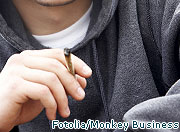At least 550 Scottish school children, including primary aged pupils, are being thrown out of class for using drugs or alcohol each year, new figures disclose.
Of Scotland’s 32 councils only nine authorities reported back with figures, suggesting numbers could be much higher.
A Sunday Post report reveals that children in Scotland are more likely to abuse drugs than alcohol in schools.
Staggering
In the three years to 2009 up to 30 primary school children were excluded for having alcohol and up to 40 were excluded for possessing drugs.
In the four years up to 2009, almost 2,200 children were excluded from school for drug and alcohol abuse.
More than 900 were alcohol-related and 1,300 were for taking drugs such as cannabis and abuse of solvents.
Worst
North Lanarkshire reported the worst figures, with 309 pupils being excluded in the last five school years including 2009-10.
An alarming 231 of these children were found in the possession of drugs, including 15 primary school children.
Tory shadow education minister, Liz Smith MSP, described the figures as “worrying”.
Appalled
She said: “Most parents will be appalled by the thought their children could be sitting next to someone with drugs or drink on them in class.
“While parents may be surprised, sadly I’m not. Having spoken to many head teachers I’m aware there has been a sharp increase in the number of kids using drugs at school. The idea of them being used in combination with alcohol doesn’t bear thinking about.
“We need a Zero Tolerance approach.”
Widespread
Ronnie Smith, EIS teaching union general secretary, said: “Drink and drug use is widespread in society today and sadly schools are a reflection of our times.
“Some of our pupils may be living with alcoholics or addicts, even dealers. It’s no surprise that some develop their own problems.”
A Scottish Government spokesperson said: “Any child misusing drugs or alcohol is a cause of great concern. That’s why the Scottish Government has placed the promotion of health and well being for all children and young people at the heart of the new Curriculum for Excellence.
Serious
“Exclusion should be a last resort by local authorities, only to deal with the most serious problems in school and the most recent national statistics publication showed that there had been a fall in the number of exclusions for drug and alcohol misuse between 2007/08 and 2008/09.”
In June a new study showed that teenagers who binge on alcohol could be affecting the part of the brain that controls memory.
Researchers at the Scripps Research Institute in California found that binge drinking could lead to teenagers being forgetful and absent minded in the future.
Devastating
Chitra Mandyam, from the Scripps Research Institute, said: “It’s very devastating to see what chronic binge drinking does to the adolescent brain”.
She added: “The public expects adolescence to be an age when you try new things and you can fight out stuff”.
“But when you’re still developing as an individual, if you change the capacity of the brain to maintain whatever it’s trying to maintain, you alter the balance of the brain as it grows”, she said.
Dangers
In March a consortium of children’s charities in Scotland backed the Scottish Government’s plans for minimum pricing on alcohol, but the plans were rejected by Holyrood in June.
The group, spearheaded by NSPCC’s ChildLine service in Scotland, urged the Government to put “children’s interests at the heart of alcohol policy”.
The charities warned that excessive parental drinking has negative affects on children through emotional stress, abuse and neglect.

